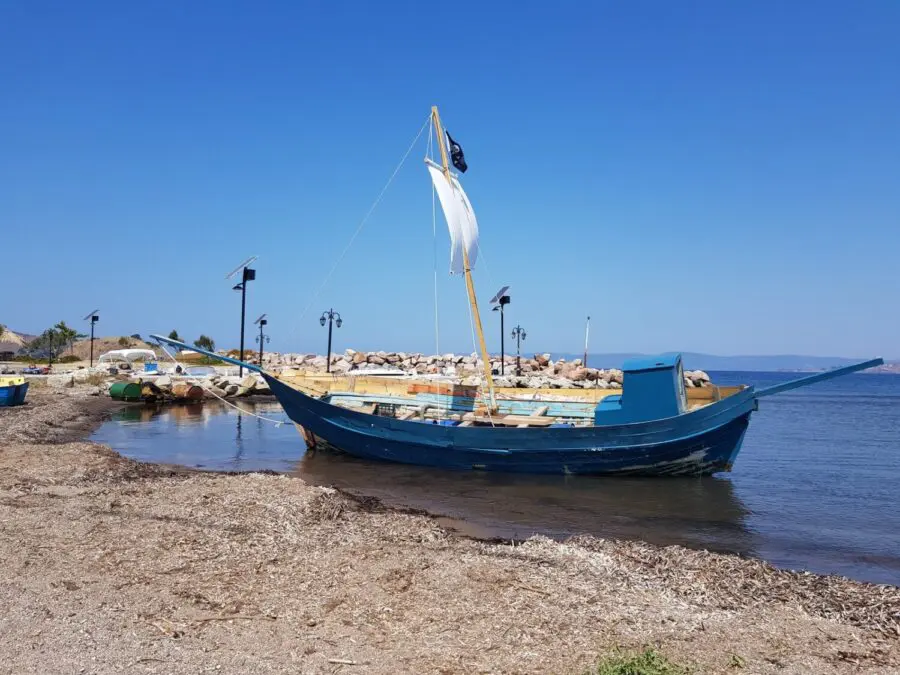Five years ago the olive grove of Moria on the Greek island of Lesbos was a sanctuary for asylum seekers. Today it is a jungle, overcrowded, threatening and all too often in flames.
Destroying an olive tree in Ancient Athens could lead to banishment, now it is the needs of the banished which have seen constant burning back of the sacred olive trees to make more space for the ramshackle tents and makeshift shelters.
Other fires regularly spring up, sometimes lit by migrants for heating or cooking, sometimes by angry inhabitants prompting the sirens of the firefighters to mingle with the voice of the muezzin, leading evening prayers.
Moria is home to nearly 13,000 asylum seekers.
Five years ago, the largest camp in Europe was intended to accommodate no more than 2,770.
Asylum seekers disembarking on the northern coasts of the island, close to the Turkish shores, were just passing through, registering, before moving their journey on.
Moria was but a stopover on their way to Northern Europe.
Back then, Lesbos was the island of solidarity, a welcoming refuge where fishermen came to the aid of drifting boats loaded with migrants, and grandmothers who bottle-fed migrant babies were nominated for the Nobel Peace Prize.
A year later, Pope Francis arrived with Bartholomew I, the spiritual leader of the world’s Orthodox Christians, mixing with the migrants and holding a mass to bless those who had died trying to reach Europe.
That all now seems a distant memory.
“At first, asylum seekers came and went but now the borders are closed,” Ilias Pikoulos, who, with his travel agency, hires buses to transport refugees, told AFP.
“The islanders have the impression that they have been facing this migration crisis on their own for years.
“And this feeling has created division, even revolt.”
In 2015, the island of Lesbos and its 85,000 inhabitants saw more than 450,000 people pass through in the space of a year.
The EU-Turkey agreement signed in March 2016 aimed to change that.
Its objective was to stop the flow coming from the Turkish coasts and send back the Syrians for whom Turkey was considered a “safe country”.
But the arrivals did not dry up and the Moria camp was quickly overwhelmed.
- ‘The refugees have ruined us’ –
Ioanna Savva, from the village of Eressos, birthplace of the ancient poet Sappho, took part in rescuing refugees and “cried” when she saw them.
“But in everyone’s eyes, Lesbos has become the island of refugees,” she says.
“The refugees have ruined us. The money that comes from organisations and the European Union amounts to millions, but the inhabitants of the island have to tighten their belts just to live.”
On top of this frustration, there is the violence against people who come to the aid of migrants.
In March, Astrid Castelein, the representative in Lesbos of the United Nations High Commissioner for Refugees, was targeted.
When angry residents prevented migrants from disembarking from their overloaded canoe in the port of Thermis, Castelein tried to calm the crowd but was assaulted.
“Has solidarity given way to xenophobia in Lesbos?” she asks in comments to AFP.
“In recent months, the tolerance of the population has decreased because it feels abandoned by the central (Greek) government and by Europe.”
At the end of July, Stratos Kaniamos, a hotelier who wanted to accommodate asylum seekers, also fell victim to violence.
“Individuals set fire to all my air conditioners, to the facades of the building, and to the van which I used to transport customers,” he says.
In 2020, Moria’s megastructure has become, according to several NGOs, “a disgrace for the whole of Europe.”
Prostitution, sexual assault, disappearances of minors, drug trafficking and fights occur almost daily in the camp, where dozens of people have been stabbed, burnt to death in their tents or have committed suicide.
From January to the end of August, five people were stabbed in more than 15 attacks.
- ‘Screams and fights’ –
The coronavirus epidemic, which led to confinement in Moria from March 21, brought a new threat to the most vulnerable.
“For a woman, even the use of the toilet here is a test,” Monire, an Afghan refugee, told AFP.
“Every day, we cover our ears so as not to hear the screams and fights. I’m afraid to leave my tent because there are rapes regularly,” continues the 30-something.
Lorraine Leete, a lawyer for the NGO Legal Centre Lesbos, said: “Greece, with the support of the European Commission, clearly continues to apply a policy of containment aimed at curbing migration.”
Now, in hotspots like Moria, Leete says “people are trapped sometimes for years, without sufficient access to water, sanitation, education and medical care”.
Even for those who have been granted asylum in Greece and decided to stay there, the road is still strewn with thorns.
Amir Ali, a 32-year-old Afghan who arrived in Greece in 2016, has won several local track and field championships, and made friendships on the island.
But, despite everything, he feels he still suffers from racism.
“At the supermarket, everyone treats me like a beggar,” he says. “But I work, I pay taxes here.”










